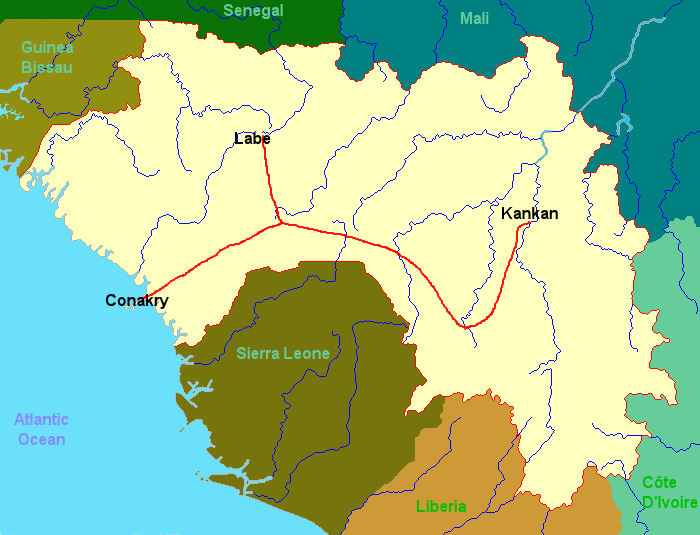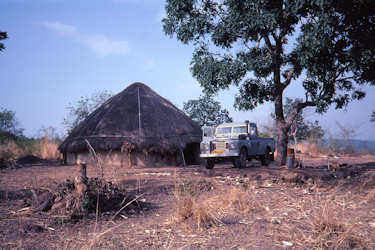Guinea

Historie
Complex societies based on trans-Saharan trade in salt and gold had existed in the region since ancient times, but the introduction of the camel
to the western Sahara in the 3rd century CE, opened the way to great changes in the area that became the Ghana Empire (c. 500 –
early 1200s AD).
By the time of the Muslim conquest of North Africa in the 7th century the camel had changed the ancient, more irregular trade routes into a
trade network running from Morocco to the Niger River. The Ghana Empire grew rich from this increased trans-Saharan trade in gold and salt,
allowing for larger urban centres to develop. The traffic furthermore encouraged territorial expansion to gain control over the different trade
routes.
The modern Sosso people trace their history to a 12th- and 13th- century Kaniaga kingdom known as the "Sosso."
With the fall of the Ghana Empire, the Sosso expanded into a number of its former holdings, including its capital of Koumbi Saleh. Under King
Soumaoro Kanté, the Sosso briefly conquered the Mandinka kingdoms of what is now Mali. These gains were lost at the Battle of Kirina
(c. 1235) when Mandinka prince Sundiata Keita led a coalition of smaller states to soundly defeat the Sosso, thus beginning the Mali
Empire.
The Mali Empire was ruled by "Mansa" (Emperors), the most famous being Kankou Moussa, who made a famous hajj to Mecca in 1324.
Shortly after his reign the Mali Empire began to decline and was ultimately supplanted by its vassal states in the 15th century.
The most successful of these was the Songhai Empire, which expanded its power from about 1460 and eventually surpassed the Mali Empire in
both territory and wealth. It continued to prosper until a civil war over succession followed the death of Askia Daoud in 1582.
The weakened empire fell to invaders from Morocco at the Battle of Tondibi just three years later. The Moroccans proved unable to rule
the kingdom effectively, however, and it split into many small kingdoms.
Fulani Muslims migrated to Futa Jallon in Central Guinea and established an Islamic state from 1727 to 1896 with a written constitution
and alternate rulers.
The Wassulu empire was a short-lived (1878–1898) empire, led by Samori Toure in the predominantly Malinké area of what is now upper
Guinea and southwestern Mali.
Guinea's colonial period began with French military penetration into the area in the mid-19th century. French domination was assured by
the defeat in 1898 of the armies of Samori Touré, which gave France control of what today is Guinea and adjacent areas.
France negotiated Guinea's present boundaries in the late 19th and early 20th centuries with the British for Sierra Leone, the Portuguese for their
Guinea colony (now Guinea-Bissau), and Liberia.
Under the French, the country formed the Territory of Guinea within French West Africa, administered by a governor general resident in Dakar.
Lieutenant governors administered the individual colonies, including Guinea.
In 1958, the French Fourth Republic collapsed due to political instability and its failures in dealing with its colonies, especially
Indochina and Algeria.
The founding of a Fifth Republic was supported by the French people, while French President Charles de Gaulle made it clear on 8 August 1958
that France's colonies were to be given a stark choice between more autonomy in a new French Community or immediate independence in the referendum
to be held on 28 September 1958. The other colonies chose the former but Guinea—under the leadership of Ahmed Sékou Touré whose Democratic
Party of Guinea-African Democratic Rally (PDG) had won 56 of 60 seats in 1957 territorial elections – voted overwhelmingly for independence.
The French withdrew quickly, and on 2 October 1958, Guinea proclaimed itself a sovereign and independent republic, with Sékou Touré as president.
In response to the vote for independence, the French settlers in Guinea were quite dramatic in severing ties with Guinea. The Washington Post observes
how brutal the French were in tearing down all what they thought was their contributions to Guinea: "In reaction, and as a warning to other
French-speaking territories, the French pulled out of Guinea over a two-month period, taking everything they could with them. They unscrewed
lightbulbs, removed plans for sewage pipelines in Conakry, the capital, and even burned medicines rather than leave them for the Guineans."
Guinea subsequently quickly aligned itself with the Soviet Union and adopted socialist policies. This alliance was short-lived, however,
as Guinea moved towards a Chinese model of socialism.
By 1960, Touré had declared the PDG the country's only legal political party and for the next 24 years, the government and the PDG were one. Touré
was reelected unopposed to four seven-year terms as president, and every five years voters were presented with a single list of PDG candidates
for the National Assembly.
A declining economy, mass killings, a stifling political atmosphere, and a ban on all private economic transactions led in 1977 to the "Market
Women's Revolt", anti-government riots that were started by women working in Conakry's Madina Market. This caused Touré to make major reforms.
Even the relationship with France improved; after the election of Valéry Giscard d'Estaing as French president, trade increased and the two countries
exchanged diplomatic visits.
Sékou Touré died on 26 March 1984 after a heart operation in the United States, and was replaced by Prime Minister Louis Lansana Beavogui,
who was to serve as interim president pending new elections. The PDG was due to elect a new leader on 3 April 1984. Under the constitution, that
person would have been the only candidate for president.
However, hours before that meeting, Colonels Lansana Conté and Diarra Traoré seized power in a bloodless coup. Conté assumed the role
of president, with Traoré serving as prime minister until December.
In 1992, Conté announced a return to civilian rule, with a presidential poll in 1993 followed by elections to parliament in 1995 (in which his
party—the Party of Unity and Progress—won 71 of 114 seats.) Despite his stated commitment to democracy, Conté's grip on power remained tight.
Conté remained in power until his death on 23 December 2008 and several hours following his death, Moussa Dadis Camara seized control in a
coup, declaring himself head of a military junta.
New presidential election was held on 7 November 2010 and Alpha Condé, leader of the opposition party Rally of the Guinean People
(RGP), won the election.
I Worked in Guinea during january - juni 1979
These are the places I have seen during that period
Conakry
Labe
Kankan
Please let me know when you're having questions.
i would be pleased to help you.
Things to do and other tips
